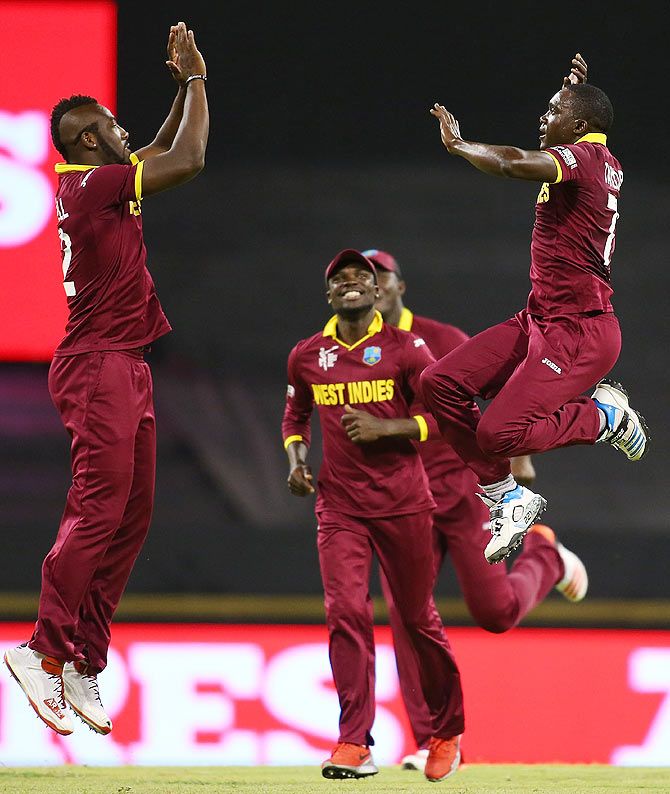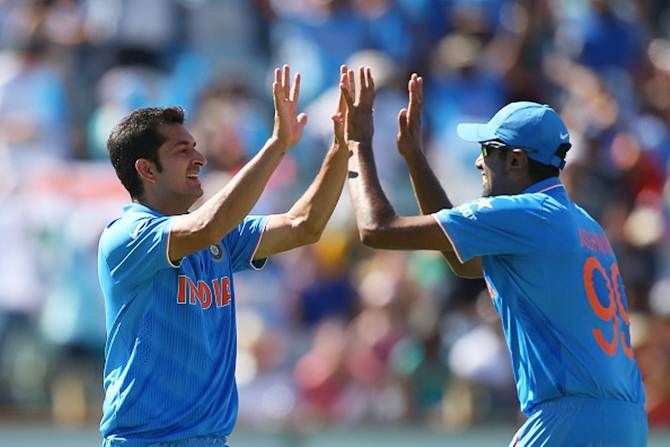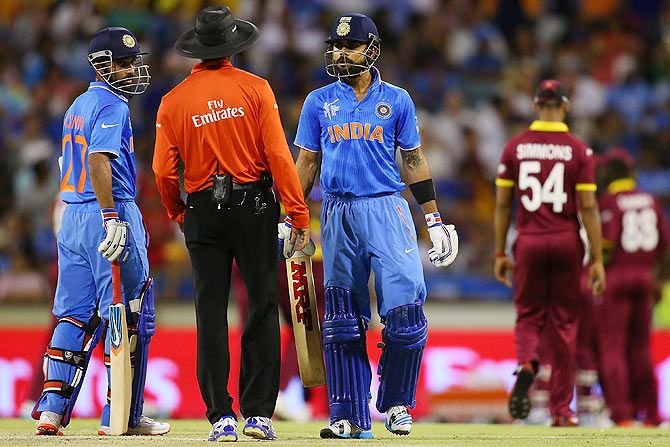'When Dhoni walked in, India needed 105 to win with 32 overs to play. The situation called for calm, nerveless, ice-cold execution without necessitating any adrenalin-fueled impestuosities -- the sort of situation that is the Indian captain's spiritual home.'
Prem Panicker, one of the world's great cricket writers, on the India-Windies game.

Chris Gayle, Gideon Haigh once wrote, is cricket's ultimate soldier of fortune -- a big man with a big bat hitting small white balls out of small grounds around the world.
His CV exemplifies Haigh's description -- Cricinfo lists the West Indies, Barisal Burners, Dhaka Gladiators, Jamaica, Jamaica Tallawahs, Kolkatta Knight Riders, Matabeleland Tuskers, Royal Challengers Bangalore, Stanford Superstars, Sydney Thunder, Western Australia and Worcestershire among the teams he has turned out for.
It is largely around his big-hitting -- 314 international sixes plus another 486 in sundry Twenty20 leagues -- that the West Indies has fashioned its Plan A: Bat first, bat big, whenever the luck of the toss permits.
For one of his ilk to be tied down by Indian opening bowlers Umesh Yadav and a fit-again Mohammed Shami was visibly irksome. During his 27-ball tenure, Gayle swished at the fuller length and swatted at the shorter one, missing oftener than he connected. It was as embarrassing as a proctological examination.
'Something had to give' is the prescribed bromide for on-air commentators at such moments. Something did. Off the last ball of the 9th over, Mohammed Shami produced another short ball on target, after his fuller length got carted the length of the field.
The ball lifted around off and seamed in, angling too tight into the body for a pull. Gayle (21 off 27) pulled at it anyway, as if he were swatting at a particularly persistent gnat, but managed only to hit it up for Mohit Sharma, at deep square leg, to hold with matter-of-fact competence.
It is tempting, when framing match narratives, to identify a 'turning point' -- the seminal moment a game swung on its axis. Any such search would stop -- a-ha! -- at the Gayle dismissal.
At the WACA, though, the Windies implosion was not due to any single big-bang moment. Watching the innings was akin to getting a ringside seat at a granite quarry -- a series of small, controlled explosions that undermined the entire edifice and brought it crashing down.
Dwayne Smith (6 off 20) had in the third over taken a Shami delivery in the solar plexus. Fidgety at being tied down, he tried to break free with a cut at the same bowler in the 5th over, but could only touch through to M S Dhoni.
In the 8th over, Gayle played another of his nothing pulls, this time at a quick delivery from Yadav. The ball flared high but desperately short of Mohit Sharma, taking a running dive from the edge of the circle at mid-on.
Marlon Samuels wanted a single; Gayle wanted to watch Sharma's acrobatics; both were at the batting end when Sharma, rolling out of his dive, threw while still prone for Virat Kohli to run Samuels out.

Gayle's implosion followed off the last ball of the 8th over and off the first ball of the 9th, Yadav produced a quick delivery outside Denesh Ramdin's off-stump that ricocheted onto the stumps off the inside edge of an ambitious drive.
One of the verities of one-day cricket is that the first ten overs can make or mar. India's success in the Cup thus far has been built around how well the opening bowlers, Shami (Kumar against the UAE) and Yadav have bowled in harness with the new ball, backed throughout by attacking fields.
The pair pegged Pakistan to 46/1 at the ten over mark; South Africa was reduced to 40/2 after 10.2 overs and the UAE, in the game previous to this, was 28/3 after 10.2.
The immaculate opening spells in harness has meant pressure on the opposing middle order; it has also enabled Ravichandran Ashwin to come in as attacking off-spinner as soon as the initial power-play is over with Mohit Sharma, at the other end, bowling tight lines with close catching options.
The pattern was repeated here, and though Lendl Simmons and an assured Jonathan Carter resisted through a 32-run stand for the 5th wicket, their association at no point looked likely to turn the game around.
Simmons, in common with his betters in the batting order, fell to the primeval fight/flight urge when, impatient of his shackles, he tried to break free with a hurried hook at a Mohit Sharma delivery outside his off stump for Yadav to take at long leg (9 off 22).
The highlight of the innings though was a sustained duel between Ashwin and Carter. Bowling into the Freemantle Doctor and switching to round the wicket, Ashwin tied up the left-hander with looping off breaks and swerving arm balls, all delivered with variable use of the bowling crease.
Carter, hemmed in by a slip and a silly point almost functioning as short mid off, responded with the drive and the cut but was repeatedly foiled by prehensile fielding within the circle.
Such contests invariably end when the batsman tries to force the bowler to rethink his plans. Carter, unable to pierce the off (15 dot balls out of 21 faced of Ashwin), swept at an arm-ball on middle angling to leg. A controlled sweep was always on, but the built-up frustration made the batsman over-hit; the extra bounce of the WACA forced the mishit and Shami, coming in off the long-leg fence, took a good overhead catch after initially misreading the ball's trajectory.
Jason Holder (57 off 64, three fours and three sweetly timed sixes into the straight field), who boasts an 87.9 strike rate in ODIs, counter-attacked with considerable nous to power a 9th wicket partnership of 51 with Jerome Taylor (11 off 18) in support.
The ease with which they moved along at 6-plus per over only underscored the culpability of their batting betters, at least until Taylor, like Gayle and Simmons before him, fell to the miscalculated hook.
The West Indies tail added 58 runs after Darren Sammy was 8th out at 124, but the final tally of 182 all out with 5.4 overs remaining was well below par for the pitch.
The Indian bowlers were yet again immaculate. They combined well in partnerships, attacked consistently and held their lines and ideal shapes even when briefly under fire, their collective control ensuring that Dhoni didn't have to fall back for some relief on the likes of Rohit and Raina.
The ground fielding remained exceptional, but for once in this tournament, the Indian catching veered towards the ordinary. Ravindra Jadeja and Rohit Sharma, two of India's stellar fielders, dropped easy chances, the former letting a Darren Sammy pull burst through his hands at point while Rohit dropped an even easier chance, when a Taylor mishit off Umesh Yadav popped out of his hands at mid-wicket.
On paper, the 183-run target was a walk for the in-form Indian batting lineup. The question was whether form would hold in the first real test against a sharp pace attack on a wicket with the bounce to give that speed an assist.
India had earlier coasted against a Dale Steyn-led attack backed by Morne Morkel, Wayne Parnell and Vernon Philander -- but that was on the slower, lower Melbourne pitch wih Philander off the field for the most part. Facing a combination of Jerome Taylor, Jason Holder, Kemar Roach and the occasionally erratic but pacy Andre Russel constituted a serious examination -- and the top order returned a C-minus.
It took Taylor a couple of overs to find his best bowling rhythm but once he did, he combined fire with intelligence and, in the 5th over, produced the sort of delivery that could do for any batsman.
Going round the wicket to the left-handed Shikhar Dhawan (9 off 14), Taylor went wide on the crease, pushed one quick on length around the fourth stump. Given the angle in, Dhawan had to play; the ball straightened late off the seam to find the edge for Sammy to take well at second slip.
In his next over, Taylor produced another excellent delivery -- quick on a driving line outside off but marginally short of the ideal driving length. Rohit Sharma (7 off 18) was lured into the shot; late swing away found the edge through to Ramdin's gloves.
The loss of the two openers was a stutter, no more, in a modest chase. The wicket that changed the dynamic of the Indian innings was that of Virat Kohli. His third-wicket partner Ajinkya Rahane was uncharacteristically scratchy and ill at ease, but seemed content to bat in Kohli's slipstream.
The Indian number three started with circumspection, and eased himself into the chase with two off-side shots that had his distinctive fingerprints all over them. In the 8th over, he leaned into a Holder delivery on length outside off; the ball raced to the cover fence as though gliding on glass. In the next over, he flowed into a length ball from Taylor to drill an even better drive through mid-on.
Those two strokes were statutory warnings of prime form. The three that followed threatened to mock the target. Roach came on in the 10th over; to the fifth ball, Kohli did that thing he does when he is feeling his oats: a shimmy to off to change the line on the unsuspecting bowler, a perfectly timed roll of tensile wrists to meet the ball with the full face of bat, and the inevitable boundary through midwicket.
Kohli seemed to like the feel of that shot; he shadow-played it a couple of times before the ball was retrieved and returned. He then played it all over again, each iteration better than the next, off Taylor in the very next over.
The remarkable aspect of this shot is that he plays it to length on the stumps, where anything less than immaculate timing and supreme confidence puts the LBW in immediate play.

Kohli's fall (33 from 36) seemed distinctly against the run of his play. In the 15th over, he imitated the West Indian batsmen in pulling at one outside his off stump; the additional bounce found the man at long leg via the top edge.
Deprived of the tall shadow of his vice-captain, Rahane's unease became more pronounced. His fall seemed a matter of time but when it came, it was a tad unfortunate. To a Roach delivery in the 18th over, Rahane aimed a dab to third man. The quick delivery flew past the edge; Ramdin went up; the umpire gave it and a puzzled Rahane asked for the review.
The replay showed nothing more substantive than a speck of dust on the snickometer. Visual evidence indicated that any sound emanating had to be from bat on pad. However, the third umpire found 'no evidence to over-rule' the on-field call -- rather like finding someone guilty only because there is no overwhelming proof of innocence.
In the event, Rahane's (9 off 22) execution stood confirmed; he walked off the field looking like he could use a hug.
This was where the nature of the test changed -- the second half of the Indian order has till date never had to bat under pressure thanks to the consistent form of the top four; it was now a matter of whether nerve and nous would withstand sudden, unexpected pressure.
First Suresh Raina, then Ravindra Jadeja, failed that test; both fell in a fashion that questioned their intestinal fortitude in the face of challenge. Raina (22 off 25) wasted a good start with a needless slash at a Dwayne Smith delivery wide of his off stump swinging wider, and top-edged to the keeper; Jadeja (13 off 23) joined the long list of batsmen who in this match perished attempting to pull from outside off.
When Dhoni walked in, India needed 105 to win with 32 overs to play. The situation called for calm, nerveless, ice-cold execution without necessitating any adrenalin-fueled impestuosities -- the sort of situation that is the Indian captain's spiritual home.
All he needed was someone to stick with him at the other end – and he found his ally in the equally cool Ashwin.
The pair walked India home with 10.5 overs to spare without ever looking remotely troubled, in the process mocking the stuttering performance of the earlier batsmen.
The West Indian quicks bowled with penetration in the first half of the Indian innings, and a consistency diluted somewhat by exuberant bouncers that helped add 19 wides to India's total.
But in the end, the target they were tasked to defend was too modest; the outcome of the match was defined too early when the four top West Indies batsmen gave it away.
Post-script: In December 1987-January 1988, India hosted the West Indies in a 7-game one-day series the visitors swept 6-1.
The Windies lineup of that year starred Gordon Greenidge, Phil Simmons, Richie Richardson, Viv Richards, Gus Logie and Carl Hooper with the bat; the bowling was led by the fearsome Patrick Patterson, backed by the Winston Benjamin and Davis plus Eldine Baptiste and the part-time spin of Richards and Hooper.
Later that year the Calypso master David Rudder released what became the official West Indies cricket anthem, the clarion call that heralds the Windies onto the field at all ICC events. The chorus goes:
Pretty soon the runs are going to flow like water
Bringing so much joy to every son and daughter
Say we're going to rise again like a raging fire
As the sun shines you know we gonna take it higher
Rally, rally round the West Indies
In the final ODI of that 1997-1998 series Greenidge (84 from 76), Simmons (104 not out off 129) and Richardson (37 not out off 55) had overhauled India's total of 241 for the loss of Greenidge's wicket; Richards, Logie and Hooper did not even need to bat.
And yet Rudder, then 35, was moved to write, in his first verse: And the runs don't come as they did before -- a testament to the standards West Indians held their team to.
What would Rudder, now nearing 62, have written today if he watched his beloved islanders crash to 35 for four inside the first ten overs, in an eventual total of 182 all out that flattered the batting effort?
DON'T MISS PREM'S EARLIER MATCH REPORTS!











 © 2025
© 2025